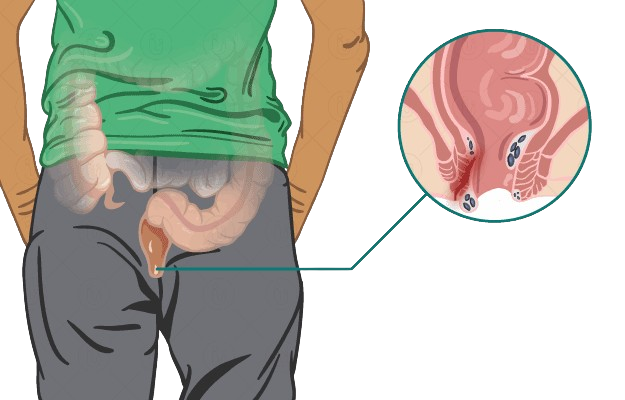Anal Fissure

Anal Fissure: Finding Relief with Ayurveda
At Yogakshema Ayurveda Hospital, we specialize in diagnosing and treating anorectal disorders, including anal fissures. An anal fissure is a small tear in the lining of the anus, often caused by passing hard or large stools. This condition can cause significant discomfort, including:
Symptoms of Anal Fissure
- Painful bowel movements – Sharp pain during and after defecation.
- Bright red blood – Bleeding during or after bowel movements.
- Itching and irritation – Persistent discomfort in the anal area.
- Pain at rest – In severe cases, pain persists even without passing stools.
Causes of Anal Fissure
- Constipation – Hard, dry stools cause tears in the anal tissues.
- Chronic diarrhea – Frequent loose stools irritate the anal area.
- Childbirth – Trauma to the anal sphincter during delivery.
- Inflammatory bowel diseases – Conditions like Crohn’s disease and ulcerative colitis increase fissure risk.
- Anal intercourse – May cause trauma to anal tissues.
Diagnosis at Yogakshema Ayurveda Hospital
- Physical Examination – Conducted by an experienced physician.
- Visual Inspection – Helps detect fissures externally.
- Video Proctoscopy – Advanced diagnostic technique for clear visualization of the anal canal, ensuring precise assessment and treatment.
Ayurvedic Treatment for Anal Fissure
Ayurveda offers a holistic approach, addressing the root cause while promoting healing and long-term relief.
1. Internal Medicines
- Soften stools for easier bowel movements.
- Reduce inflammation and pain.
- Promote natural tissue healing.
- Balance Vata dosha, which plays a key role in fissure formation.
2. External Therapies
- Snehana & Swedana – Oil massage and herbal steam therapy to improve circulation and reduce inflammation.
- Sitz Baths – Warm water baths with herbal infusions to soothe irritation and promote healing.
3. Lifestyle Modifications
- Dietary Changes – Increase fiber intake (fruits, vegetables, whole grains) for smooth bowel movements.
- Hydration – Drink sufficient water to prevent constipation.
- Stress Management – Yoga and meditation help prevent stress-induced digestive issues.
Surgical Management (When Necessary)
In cases where conservative treatments do not provide relief, surgical options may be considered:
- Internal Lateral Sphincterotomy – A minor procedure to release the tight anal sphincter, reducing pain and promoting healing.
- Fissurectomy – Surgical removal of the fissure and any associated skin tags.
Post-Surgical Care
- Sitz Baths – Essential for healing and pain relief.
- Dietary & Lifestyle Modifications – Continue a high-fiber diet and avoid constipation.
- Pain Management – Medications may be prescribed to ease discomfort.
Preventing Anal Fissures
- Maintain regular bowel habits – Avoid constipation by eating fiber-rich foods, drinking water, and staying active.
- Manage stress – Reduce stress with relaxation techniques like yoga and meditation.
- Avoid straining – Take your time during bowel movements to prevent undue pressure on the anal area.
Expert Care at Yogakshema Ayurveda Hospital
Experience the expertise of Dr. Shyam Prasad P.S., a renowned Ayurveda General Surgeon with 17+ years of experience in treating anorectal disorders.
At Yogakshema Ayurveda Hospital, we provide comprehensive Ayurvedic treatment for anal fissures, ensuring a natural, effective, and long-term solution for our patients.
